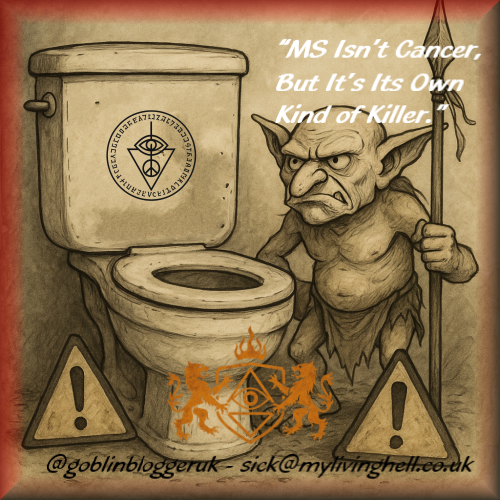- Posted on
⚠️ Please read with care: This blog shares personal, sometimes painful experiences. My intention is to support and speak honestly not to harm. I’m not a professional, just someone who understands how hard it can get. If you're struggling, you're not alone please reach out for professional help.
My brain fog is crushing. Spasms and weird electric shocks twist through me; words and sentences scramble wrong. The tinnitus that constant, maddening noise won’t quit. Some days I just want to vanish. I watch my rescue dog sleep on the webcam and envy that calm so much it hurts. Everyone offers clichés and advice they’d never follow themselves. It’s exhausting.
I’ve asked to speak to my doctor again. I don’t know how it’ll go. If my guts blow up over the weekend I’m screwed. The dark thoughts creep in the part of me that imagines ending it and I hate that I think that. I need help. I need someone to actually see this and do something that changes it.
Right now I’m broken, sore, and furious. I’m still here, still fighting, but not because I want to be brave because I don’t have anything left but stubbornness.
MS isn’t cancer, but it’s its own kind of killer. It’s not Crohn’s, not ulcerative colitis I’ve had the scans, the cams, the lot. They shoved cameras where the sun don’t shine, took biopsies, waved a cheerful “nothing to worry about,” and sent me home with a sticker that says “reassured.” Fine on paper. Not fine in me.
Let me be blunt: they sliced into the wrong place. The red patches they found were right where my MS‑riddled nerves were already a mess. They cut, they biopsied, and they left me with nerves that used to hum now screaming in high‑voltage agony. I didn’t get better. I got scorched.
Picture me on the lavatory, clutching the edges of a stupid toilet that feels like a cliff pain so deep it isn’t even physical in the normal sense. It’s like someone rewired my insides to a broken amplifier and turned the volume to nuclear. Tears, bile, a clear spit‑drip from my mouth I can’t stop as my body fights to keep food down. I hold back vomit with every breath because the world tilts and the noise in my head goes white‑hot. I wish I were anywhere else. I wish I were normal. I wish for a million useless little things.
The scope was a circus. First prize: the doctor’s finger, the NHS lube, and the ASMR of humiliation. “Your prostate’s fine,” he says, smiling like a man who fixed a leaking tap. That’s the comedy of it they poke, they probe, they make notes, they rule out “nasty” things, then pat you on the head and go home while your nervous system burns.
Now the aftermath: neuropathic pain that laughs at paracetamol, spasms that feel like electric shocks through my guts and spine, brain fog that scrambles words until typing is a battle with my own brain, tinnitus that keeps me company like a sad little radio, dissociation so deep I sometimes watch someone else live my life. There are moments I cry because the pain and the not‑quite‑rightness of my head make me certain I’m splitting, losing the edges of myself. People hear me say it and step back like I’m contagious with honesty. The more truth I dump, the more people get uncomfortable and that’s lonely in its own corrosive way.
I can’t sleep properly. I can’t plan. Every day is punctuated by the possibility that my bowels will decide to implode at the worst possible moment. I’ve learned the humiliating art of pre‑emptive management and still get blindsided. I’m on edge all the time jacked into a nervous system that lies constantly.
And then there are the small, absurd consolations. My rescue dog Yopi decompressing on the webcam, stretching like a champion in her perfect dog‑world while I sit in mine and try not to dissolve. “Doggy wants a big poo,” the universe whispers, and I laugh like a madman because that’s the only way to keep from screaming. I even joke about the vet’s number in my phone because if my guts explode over the weekend, who do I call my vet or the NHS? It’s dark. It’s ridiculous. It’s my life.
So yes: not cancer. Not “nasty.” Just MS doing what MS does best wrecking the wiring and turning normal procedures into torches. The biopsy didn’t fix anything. It made certain spots of nerve tissue more violent, more reactive, more relentless. That “nothing to worry about” line sits in my records like a bad joke. It doesn’t help me when the nerves scream at night and the world feels like a bad transmission.
If you think this is melodrama, try living it. Try Googling “neuropathic bowel pain” with one hand while feeding yourself with the other when your head is full of static and your fingers don’t spell the words you mean. Try explaining to someone that the worst part isn’t dying it’s being trapped in a body that betrays you every hour while everyone treats the notes in your file as the whole story.
I’m not looking for pity. I want acknowledgement. I want the system to stop offering livestock‑level reassurance and actually treat the neuropathic hit the biopsy dealt. I want less suffering. I want some dignity back on the lavvy. I want someone to take seriously that “not cancer” isn’t the same as “not a problem.”
If that’s too much to ask, fine. I’ll keep shouting here where the noise won’t make anyone uncomfortable. Yopi will keep farting on camera. I’ll keep writing it down. The nerves might scream, but my voice crooked, bitter, and honest is still here.
I write in ink and fury, in breath and broken bone.
Through storm and silence, I survive. That is the crime and the miracle.

